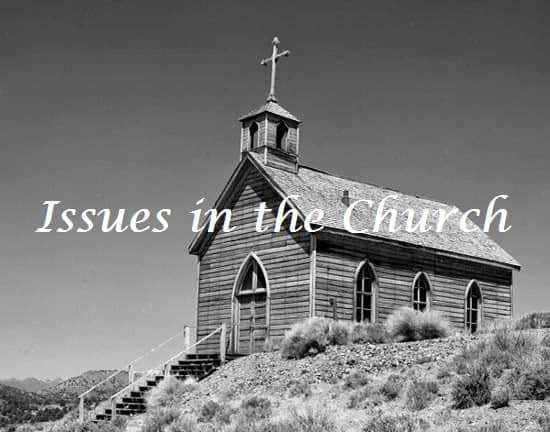⏱️ Estimated Reading Time: 9 min read
Editor’s note: The purpose of this series is to write on “Issues in the Church” that either aren’t talked about, ignored entirely, or that we want to contribute to the discussion on. Our goal with this series is to help our readers think through these issues from a biblical worldview with lots of practical gospel-application.
- Read the rest of the series here.
**************************************************
It is striking how often Jesus’ apostles warn the church about false teachers and divisive persons. In the Pastoral Epistles Paul calls Titus and Timothy to beware of false teachers in Crete and Ephesus, respectively. But it’s not just these two pastors who are to address falsehood, the entire New Testament calls out the darkness resident in the church. Because of the cosmic conflict between Christ’s church and Satan’s hordes, false doctrine and false living are regular threats to Christ’s kingdom.
Since many churches face such internal and internecine threats, we need to steel our minds with God’s Word so that we might boldly address the darkness around us.
Beware of False Teachers
In the Pastoral Epistles, Paul takes particular aim at those who teach false doctrine (1 Tim 1:3–4), impose rules that go beyond the Bible (1 Tim 4:3), lead astray weak-willed women (2 Tim 3:6), vacillate about truth (2 Tim 3:7), and promote disunity by means of foolish arguments (Titus 3:9; cf. 2 Tim 2:23).
Of these trouble-makers, Paul writes in 1 Timothy 6:3–5,
If anyone teaches a different doctrine and does not agree with the sound words of our Lord Jesus Christ and the teaching that accords with godliness, he is puffed up with conceit and understands nothing. He has an unhealthy craving for controversy and for quarrels about words, which produce envy, dissension, slander, evil suspicions, and constant friction among people who are depraved in mind and deprived of the truth, imagining that godliness is a means of gain.
In Titus 3:9, Paul again addresses warring words. He concludes, “quarrels about the law, . . . ” (i.e., discussions about the law that don’t bring sinners to the gospel, see 1 Tim 1:8–11) are “unprofitable and worthless.” Moving from the argument to the arguers (vv. 10–11), he condemns all who stir up division and calls church leaders to warn friction-makers with an eye to dismissing them if they will not stop. He concludes, “such a person is warped and sinful; he is self-condemned” (v. 11).
Second Timothy 3 repeats Paul’s conviction that troublemakers will expose themselves. After listing the types of sins that will be prevalent in the church in the last days (vv. 1–5), he writes, “Avoid such people. . . . these men also oppose the truth, men corrupted in mind and disqualified regarding the faith. But they will not get very far, for their folly will be plain to all, as was that of those two men [i.e., Jannes and Jambres]” (2 Tim 3:5–9).
The Fruit Tells the True Story
What is striking and discomforting for most of us is how personal Paul’s words are. Against the rule of thumb that says, “Don’t attack the person,” he uses an ad hominem (against the man) approach. And why is that? Why does the apostle point fingers at people? Because Paul was a disciple of Jesus, not Ghandi. In the Sermon on the Mount, Jesus said,
Beware of false prophets, who come to you in sheep’s clothing but inwardly are ravenous wolves. You will recognize them by their fruits. Are grapes gathered from thornbushes, or figs from thistles? So, every healthy tree bears good fruit, but the diseased tree bears bad fruit. A healthy tree cannot bear bad fruit, nor can a diseased tree bear good fruit. Every tree that does not bear good fruit is cut down and thrown into the fire. Thus you will recognize them by their fruits. (Matt 7:15-20)
Bad fruit doesn’t come from good trees and any good fruit on a bad tree will always rot on the branch. Time will prove that every good fruit on a bad tree was hung there like Adam and Eve hung fig leafs. For a season, bad trees can show promise of being good, but inevitably the pressures of life will reveal the spiritual sap of a person. It was for this reason that Paul pointed to the people and not just their points of view. Out of the overflow of the heart, the mouth speaks (Matt 12:34). And in the church, violent speech always poisons the well.
Faith is Personal, Never Private
In fact, when we look closer at Paul’s warnings, we may get even more uncomfortable. For us who live in the shade of Griswold vs. Connecticut privacy, Paul’s willingness expose individuals by name is scandalous. But yet he does it. Again and again.
In 2 Timothy 4:10 Paul highlights Demas, a former co-laborer (Philemon 24), who left him to chase the world. Four verses later, Paul names Alexander, a coppersmith who had wronged him (v. 14); Paul warned the church to watch out for him (v. 15). This warning echoes Paul’s earlier words about him and Hymenaeus, whom Paul “handed over to Satan that they may learn not to blaspheme” (1 Tim 1:20).
For us this public judgment seems cruel and unusual, but for Paul it was standard operating procedure. In many of his letters, he spoke directly about individuals (e.g., the incestuous fornicator in 1 Corinthians 5; Peter and Barnabas in Galatians 2; and the slothful in 2 Thess 3:10–11). Take Philippians, for example. In this joy-filled letter, he entreats the church to help Euodia and Syntyche get along (4:2–3). In Paul’s understanding it was not the task of these two women to work out their differences by themselves. It was a church matter; everyone was to be involved. This grates against our American individualism, but that just shows how far our orthopraxy (right practice) is from God’s will.
Calling Out and Naming Bad Apples
Now, some might push back: this style of confrontation is just a hang-up with Paul. Perhaps Herod was right: “Paul, your great learning is driving you mad” (Acts 26:24). But upon comparison with other apostles, we learn that his approach is normative. For instance, Jude changes the whole course of his letter (vv. 3–4) to address false teachers creeping into the church. Peter too points out the ungodliness of false teachers (see 2 Peter 2). Interestingly, it is not the doctrine he focuses on, so much as the words and actions of these men. Still, it is Jesus’ beloved disciple who is most explicit in calling out and naming bad apples.
In John’s second epistle he warns against those who do not abide in the teachings of Christ (v. 9): “If anyone comes to you and does not bring this teaching, do not receive him into your house or give him any greeting, for whoever greets him takes part in his wicked works” (vv. 10–11). How instructive. To love one another requires a basic commitment to gospel truth and moral obedience. Those who deny Christ with their doctrine or their disobedience are to be kept out of fellowship until they repent.
John’s emphasis on godliness grows in his third epistle. Focusing his gaze on one man who is destroying the church, he writes, “I have written something to the church, but Diotrephes, who likes to put himself first, does not acknowledge our authority. So if I come, I will bring up what he is doing, talking wicked nonsense against us. And not content with that, he refuses to welcome the brothers, and also stops those who want to and puts them out of the church” (vv. 9 –10).
As an apostle, John has the delegated authority to personally condemn Diotrephes. No individual Christian has the right to do that today. Even pastors do not have the authority in themselves to say, “Because this man does not acknowledge me, I will bring up what he is doing.” No, it is the apostle’s inspired words that matter. Biblical truth is the issue. And Christians, pastors, and especially churches, have a right and a moral obligation to confront the men and women who are straying from true doctrine and true living.
In fact, to ignore Diotrephes, the man in the congregation who puts himself first, is a recipe for congregational disaster. While such men or women damage the church; permitting their sin is equally lethal. When such behavior recurs in the church, each person has to ask the question: Is God calling me to confront falsehood or flee from it?
Being the Pillar and Buttress of Truth
In the end, the church of Jesus Christ is not a social club, nor a holding tank for heaven. The church is a military outpost for the kingdom of God that Jesus is establishing on earth. And one of Satan’s ancient strategies (think: Balaam) is to worm sin into heart of the church. He can do this through false teaching or false living, but when he slithers into the church, he always does so with individuals. And none of us are off-limits from his deceptions. Even believers can be used (not possessed) by Satan to bring devastation into the church (2 Tim 2:26).
For each of us, especially leaders, we must examine ourselves by the words of Scripture (2 Cor 13:5). We must plead for God to show us our sins, that we might rejoice more deeply in the grace of the gospel. We must be quick to reconcile ourselves to others, that we might not become the foothold Satan uses to pillage Christ’s church. In our churches, must defend the gospel and protect gospel truth (1 Tim 3:15). This ministry of protection includes preserving doctrinal truth and upholding biblical holiness.
This post first appeared at David’s blog and is posted here with permission.




